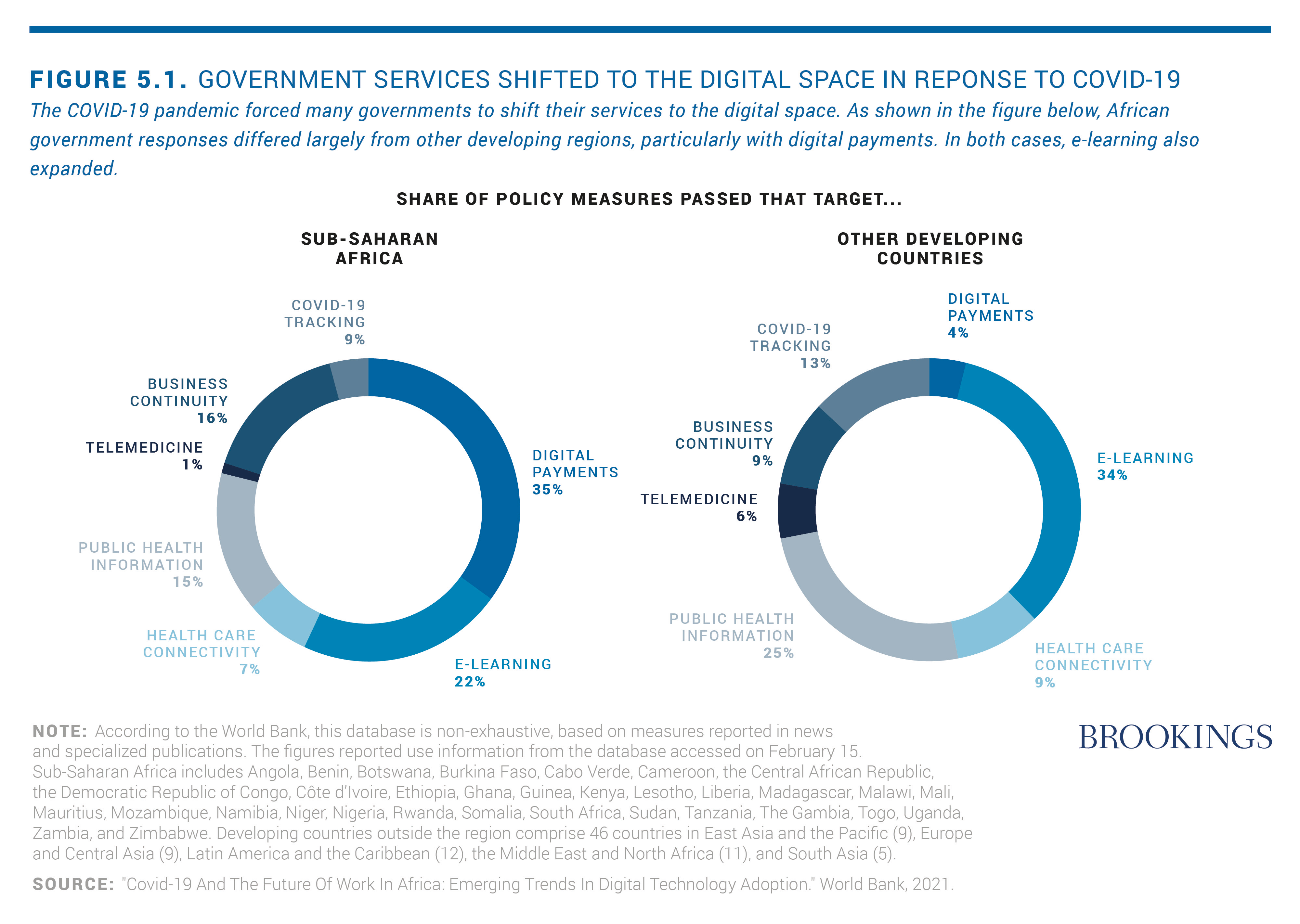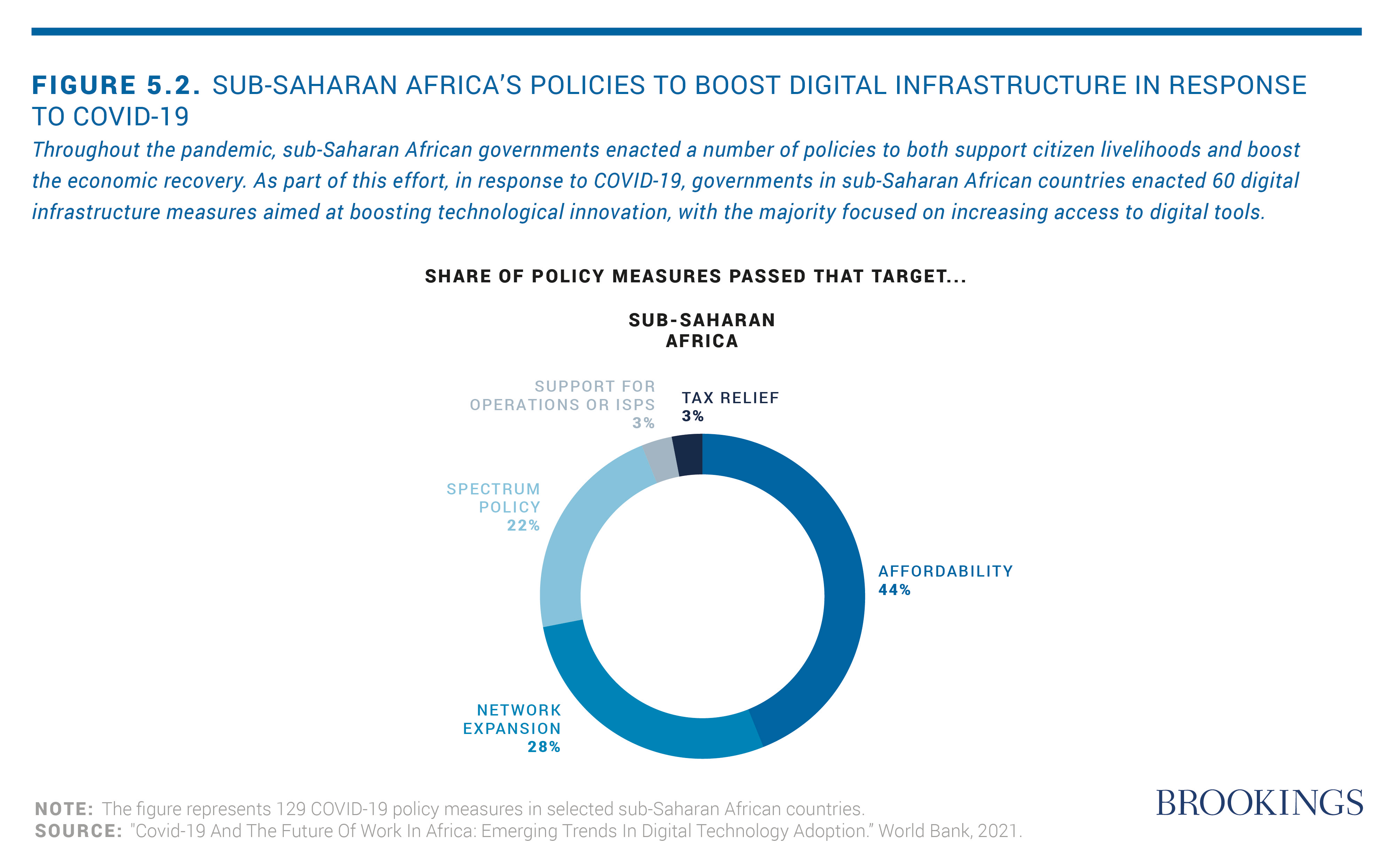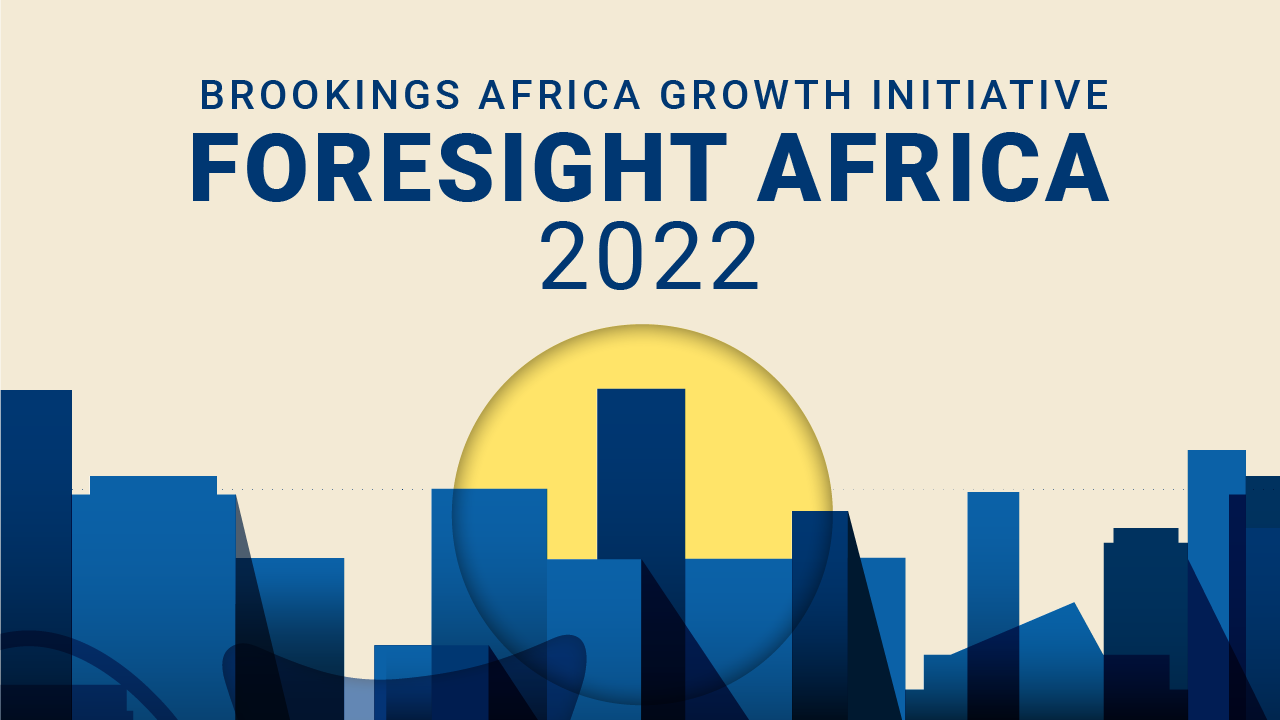Chapter
05
Technological innovations:
Creating and harnessing tools for improved livelihoods
Harnessing technology and innovation for a better future in Africa: Policy priorities for enabling the ‘Africa we want’
The COVID-19 crisis has changed how the world functions, bringing to light many limitations of existing systems and showing the need to reimagine the role of informational technology as a tool for economic growth. Indeed, the pandemic has accelerated the velocity and effectiveness of technology innovation, adoption, policy, and regulation. Although African countries have benefited from the acceleration of technological uptake across sectors, such as health care or economic transformation, the region still grapples with gaps in critical areas, including in human capacity and infrastructure.
Importantly, the unique global policy momentum that has led to unlocking barriers to technology and innovation during the pandemic provides further evidence that governments can play a key policy role not only in enabling technological innovation, but in supporting its diverse uptake and use. In fact, during the pandemic, African governments looked to enact policies specifically to boost technological innovation and uptake (Figure 5.1).

Policy recommendations
To make the most of technology and innovation, African governments must exploit the momentum of innovations already occurring across the continent and remove the barriers to growth and development that remain. I posit seven priorities for policymakers looking to enable and harness the future of technology for a prosperous continent.
Invest directly in information and communications technology and infrastructure development. Internet expansion will be key to long-term innovation and adoption of more advanced technology, from the Internet of Things to artificial intelligence and beyond. While the ICT and mobile sectors have grown in recent years, millions in Africa still lack connectivity. Gaps in internet access prevent citizens from accessing the full scope of internet services; slow economic growth; limit Africa’s potential to trade and interact with the world; and lead to inaccurate, biased data collection. If African countries want to advance technologies like electricity and broadband, they must first have better access to physical and digital infrastructure.
Moreover, policymakers must not overlook traditional infrastructure, as it is necessary for African countries to attract greater amounts of venture capital and investment. The completion of major energy and transportation projects—such as the Grand Ethiopian Renaissance Dam, the North-South Rail and Road Corridor in Southern Africa, and South Africa’s Jasper Solar Farm—will be a key step signaling Africa’s modernization to firms and investors from around the globe.
“The unique global policy momentum that has led to unlocking barriers to technology and innovation during the pandemic provides further evidence that governments can play a key policy role not only in enabling technological innovation, but in supporting its diverse uptake and use.”
Collectively through multistakeholder partnerships, African countries must rapidly harness inclusive and sustainable digitalization to help build more equitable societies. African countries can do so by seeking to improve their infrastructure and make faster progress by courting regional and international partners rather than by working alone. African countries can learn from Morocco, whose robust infrastructure development has succeeded, in part, by incorporating multiple public and private sector partners under regional initiatives: For example, the country’s high-speed rail project was built by French engineering company Alstom and received joint funding from France, Kuwait, Saudi Arabia, and Abu Dhabi.
Modernize and expand access to education, learning, and skills. Productive, inclusive growth in the context of automation requires that technology complements, not substitutes, workers. However, to do so, those workers and entrepreneurs must be equipped with diverse, relevant skills for the rapidly changing global economy. The literacy of Africa’s workforce should be increased in a range of soft and hard skills to be flexible and dynamic: Public and private institutions should partner with universities to develop effective continuing and executive education programs. Digital literacy skills can be enhanced by the development of future-ready curricula that creates a culture that encourages lifelong learning. African states should also create or accelerate the development of engineering and business schools, as well as technical vocational colleges to support industrial growth and create models of training based on the changing needs of the private sector. Additionally, African countries should integrate emerging technologies into education more systematically to improve learning outcomes through adaptive and collaborative learning platforms, distance learning, increased availability of learning materials, and dissemination of advanced pedagogies.
Increase the capacity of research institutions to participate in research and development activities and protect intellectual property. Research and development (R&D) investments, including in the public and private sector and universities, have positive effects on economic growth by encouraging the development of new knowledge, techniques, and technologies that improve productivity. Currently, South America and Africa combined are responsible for less than 5 percent of the total global R&D spent, despite having more than 20 percent of the world’s population. Indeed, Africa itself falls short of the 1.7 percent R&D global average, with many African countries only investing 0.42 percent of their total GDP. To improve participation in R&D, governments can provide incentives to research organizations (such as allowing companies to commercially exploit technology developments arising from government-funded research); build pools of researchers and innovators by providing scholarships and investing in human capital and education; increase the capacity of research institutions to undertake quality research by providing funding; and encouraging diaspora scientists, engineers, and innovators to return. Governments should protect intellectual property (IP) rights to stimulate the generation of new innovations and technologies. Such interventions can take the form of patents, copyrights, design rights, trademarks, and similar policies for protecting trade secrets.

Steer investment toward high-productivity and labor-intensive industries. In the context of accelerated technology and innovation developments, countries need to take proactive measures to identify and exploit comparative advantages in the new industrial niches presented by the latest technology. Prioritizing the growth of labor-intensive industries is particularly important for ensuring employment among Africa’s growing youth population. Another key step will be fostering competition between firms by reducing barriers to entry. For example, the Moroccan government’s work to create networks of innovators in key industries, support research in advanced technologies, coordinate the efforts of the public and private sectors in innovation, and provide information for foreign investors can serve as a model for African countries exploring ways to encourage productive investment in new technologies. In line with successful examples seen in countries like Mauritius and Rwanda, countries can also establish science parks and technology hubs to encourage innovation. Another successful example is the creation of the Smart Africa Alliance, a collaboration between Smart Africa, the Digital Impact Alliance, and the Kenyan government to create a framework used for developing and achieving a digital economy.
Expand and support intra-regional trade and investment, as they accelerate industrial development and create a larger market for innovations. Lowering trade barriers within Africa can spur industrial growth and innovation, as it enables African countries to compete globally with the advanced economies that have historically dominated technological revolutions. The African Continental Free Trade Area (AfCFTA) represents a key stepping stone towards building a robust, competitive market for goods across Africa. Further cooperation among African states using existing multilateral arrangements such as the African Union and African Development Bank is a vital way for African states to pool their resources efficiently and reduce regional deficits in trade and infrastructure. The East African Northern Corridor Agreement, for example, could serve as a model for larger agreements extending into North and sub-Saharan Africa incorporating ICT integration and other infrastructure development. Technology, innovation, and entrepreneurship will be the accelerators in these projects. Additionally, regional organizations should create frameworks to help address youth unemployment challenges around the continent to help other expansion areas.
“Productive, inclusive growth in the context of automation requires that technology complements, not substitutes, workers.”
Create institutions to manage technological disruption, encourage innovation, and ensure security. Policies to support innovation and protect citizens are only as good as the institutions that enforce them. As such, leaders should set up agile institutions empowered to work across ministries. These institutions can also help ensure that consumers are protected from practices such as overpricing, poor quality, and privacy violations and can foster a fair and competitive ICT market. These institutions can also serve as catalysts for industrial policies, which may include tariffs, subsidies, incentives to businesses, infrastructure investments, and other measures aimed at improving the competitiveness of domestic firms and promoting innovation and structural transformation. Importantly, with digital innovation comes risks threatening privacy and security worldwide, so domestic policies and international cooperation can play a critical role in creating a more inclusive future. Thus, establishing a data privacy act and a national cybersecurity plan as well as identifying and addressing regulatory gaps related to new technologies can mitigate some of the risks presented by the technology and innovation revolution.
Ultimately, develop and successfully implement inclusive comprehensive national and continental strategies for harnessing technology and innovation for a better future in Africa, building on the recommendations presented above. Inclusive prosperity requires diverse stakeholders—including firms, government agencies, nonprofits, and individuals of various backgrounds—to check against organizational and group biases. Moreover, coordinated strategies facilitate policy coherence and equal implementation. Here, continental institutions (e.g., the African Union and its specialized agencies) can play a central role in balancing the interests of potential winners and losers.
In conclusion, to make the most out of technology and innovation, African governments and entrepreneurs should move proactively, anticipate disruptive innovations and their implications, build capacity and the conducive environment to unlock their potential, recognize new niches for industries, leverage uniquely African advantages, invest in their youth and entrepreneurial populations, and collaborate across stakeholders to achieve sustainable, inclusive growth. Given considerable gaps in infrastructure and R&D output, Africa must improve its infrastructure and prepare its young workforce for new technologies to avoid asymmetric growth between it and the rest of the world. The future of Africa depends on success in this endeavor.
Viewpoints

The private sector must do its part on data governance in Africa
Lesly Goh and Buhle Goslar argue that the private sector must step up in protecting consumers from digital harms and offer recommendations for businesses looking to be proactive in data protection.

Tara Nathan discusses four fundamental challenges to private sector engagement in enhancing Africa’s digital infrastructure.

Boosting the AfCFTA: The role of the Pan-African Payment and Settlement System
Mike Ogbalu III discusses the benefits of implementing the African Continental Free Trade Agreement and Pan-African Payment and Settlement System for long-term sustainable economic growth and development across Africa.

The role of cryptocurrencies in sub-Saharan Africa
Bitange Ndemo explains how cryptocurrencies can help level the economic playing field in sub-Saharan Africa.

Developing an effective data governance framework to deliver African digital potentials
Adedi Peter Adeniran offers recommendations for policymakers looking to develop an effective data governance framework in Africa.

Africa and the future of digital diplomacy
Olubukola S. Adesina discusses trends in digital diplomacy and how African leaders might use digital tools to supplement traditional diplomatic efforts.


